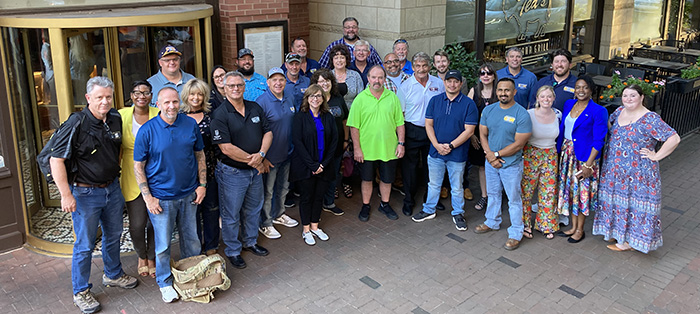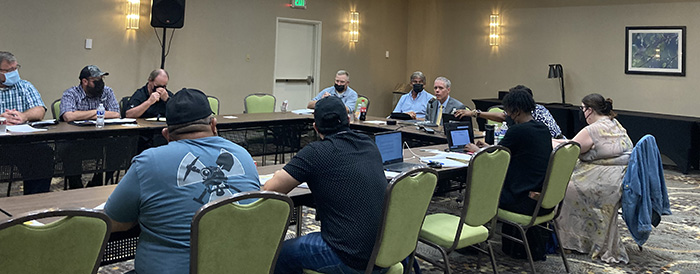USW International Vice President Roxanne Brown set the tone for the Atomic Energy Workers Council (AEWC) meeting held Sept. 19-20 in Washington, D.C., urging the council to think strategically about ways to use the infusion of funds from the Inflation Reduction Act and the bipartisan infrastructure bill to create density in the sector.

The new legislation presents opportunities for atomic workers to play a critical role in achieving a net-zero carbon future, Brown said.
She provided AEWC council members with an in-depth look at the numerous funding sources available for nuclear projects and emphasized the unprecedented opportunities the USW can harness amidst climate-driven energy goals.
The Inflation Reduction Act, passed last month, includes a series of tax incentives to help deploy advanced nuclear technologies, including small modular reactors, which have the potential to generate safe, clean and cost-effective energy.
“This is the first time U.S. tax policy will be used to deploy nuclear technology – it’s never been done at this scale before,” said Brown to the council. “This is a huge potential opportunity for this sector if it’s done right, and if industries and companies actually decide to invest in what’s possible in terms of these pots of money.”
COVID-19 policy, workforce shortages concerns
AEWC President Jim Key helped bring the council’s concern about vaccine requirement discrepancies among contractors to Ike White, Acting Assistant Secretary for Environmental Management at the DOE, who spoke in-person to members of the council at the end of meeting day two.

“You shouldn’t have three contractors at one site, where one contractor will terminate five people and the other two contractors will make accommodations. I think that’s totally wrong,” said Key. “It’s a hurt and disgrace to those workers to be terminated and not have the provisions for weekly testing and masking that the other two on-site contractors provided.”
COVID-19 policy is all over the charts, said Local 689 President Herman Potter of Piketon, Ohio. Potter said contractors still requiring vaccines have trouble finding new hires and keeping the workers they do have.
This compounds broader challenges with work force shortages. Non-union building trades provide shorter training programs, said Potter, which attracts new hires but produces workers who have less technical training and puts the community’s safety in jeopardy in the long run.
“We’re having problems getting people, but we’re also having for the first time ever people turning offers down,” said Bill Collins, Local 12-369 president at Hanford in Washington state.
Radiological Control Technician training program a ‘huge success’
Ashlee Fitch from the USW’s Health, Safety and Environment department gave an update on the Tony Mazzocchi Center’s six-month radiological control technician training program, which recently ran highly successful pilot programs at Portsmouth and Paducah.
“Paducah did this training as a pilot program, and it’s been a huge success. 18 out of 20 people passed the test the first try,” said Gary Wilson, president of Local 550 at Paducah. “This is developing human infrastructure, and now’s the time to do it.”
The USW is the only union that is authorized to give RCT trainings.
“This is a model that is Steelworker-led and that we can own,” said Brown.
The council set March 12-13, 2023, as tentative dates for the next council meeting in Washington, D.C.
